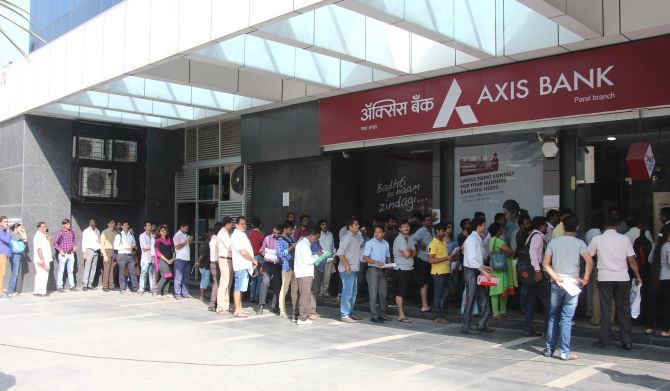
'In the coming months, expect more government action that will be packaged as an assault on black money,' warns A K Bhattacharya.
The economic consequences of the Narendra Modi government's decision on demonetisation have been debated extensively. The broad consensus seems to be that even though demonetisation of currency notes with denominations of Rs 500 and Rs 1,000 will eradicate the stock of black money hoarded in cash (and not generation of fresh black money), the inconvenience caused to the common man and the disruption in the economy are disproportionately higher than the gains expected to accrue from this measure alone.
The share of such high denomination currency notes in total cash in circulation is as high as 86 per cent. The withdrawal of such notes without making adequate advance arrangements for replenishing them quickly, therefore, has both delivered a sudden shock to the cash economy (accounting for almost 90 per cent of commercial transactions in the country) and triggered a slowdown in economic activity.
The government has responded to the crisis by tweaking the norms for exchange of notes to prevent misuse and expanding the areas where the demonetised notes could continue to be used.
These measures have had some impact by reducing the inconvenience for people, but the distress in both urban and rural India (particularly for farmers, traders and small enterprises) is not yet over.
Not surprisingly, estimates of the growth in gross domestic product for the third quarter of the current year have already been scaled down by more than two percentage points. The stock market, too, is reflecting a nervousness that usually precedes a marked slowdown in corporate earnings.
It is a measure of the ordinary Indian's patience that no unruly outburst or unrest has as yet been reported. Also, the employees in most banks have faced up to this Herculean task heroically even though they were left to carry the can for the policymakers' failure to undertake advance preparations for a gigantic operation of replacing 23 billion currency notes.
There is also sufficient merit in the argument that only a small portion of the black money is kept in cash and, therefore, any assault on the parallel economy will be insignificant and incomplete, unless other policy measures are taken to curb generation of different types of unaccounted income by bringing them under the tax net.
Most likely, such steps, too, are on the anvil, as has been indicated by the prime minister and other senior government leaders.
But for now, any claim of victory over black money by merely demonetising currency notes would be highly exaggerated and would even appear cynical given the economic dislocation and inconvenience to people already caused by this decision.
To be sure, black money was only one of the three targets of the government's demonetisation move. The other two targets were fake currency and terror funding with such notes.
But as K C Chakrabarty, former deputy governor of the Reserve Bank of India, has so aptly said, you do not throw away the entire bag of rice just to get rid of a few small stones or foreign particles in it.
Instead, you need to assess the extent of contamination and weed that out through targeted attacks on sources of such fake notes.
So, what was the big hurry for the government to go ahead with demonetisation now?
And, why couldn't adequate planning be made in advance to facilitate this massive exercise smoothly?
It is unlikely that the government did not anticipate the kind of disruption and inconvenience that demonetisation of high denomination currency notes would cause.
Is it then politics that determined the timing of the decision? Consider the following:
The Narendra Modi government had three big electoral promises to fulfil: Development, jobs and removal of black money.
Half-way in his tenure, Modi may well have taken stock of his performance and realised that the government's track record on development has not been too spectacular.
Yes, the policy hurdles throttling key infrastructure sectors have been removed and some new projects have begun rolling out. But such gains are going to be slow given the current pace of the Indian economy and the global economic situation.
In respect of Modi's second promise of creating more jobs, the government has performed poorly, largely because the new pattern of economic growth does not create as many jobs as used to happen even a decade ago.
Indeed, whatever jobs growth may take place will be more dependent on the pace of manpower skilling, an area where India's performance in recent years has not inspired much confidence.
That leaves the third item on Modi’s agenda -- black money. The earlier schemes to bring back money stashed away in foreign countries and allow residents to declare unaccounted wealth by paying tax at a penal rate did not help unearth huge amounts of black money.
These could hardly be used to show that the government has unleashed an assault on black money. Something bigger and dramatic action was necessary to convince the electorate that the government was serious about its promise of an assault on black money.
With major state assembly polls scheduled in 2017 and the 2019 general election not being very far away, the campaign against black money had to acquire salience and visibility.
Any further delay would not have been politically wise.
The argument seems to be that economic consequences of demonetisation can be managed, but the political consequences of delaying visible action against black money could be worse.
In the coming months, therefore, expect more government action that would be packaged as an assault on black money.











